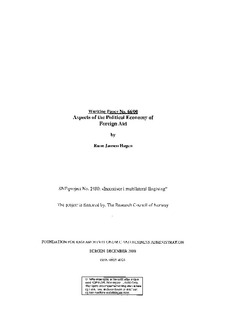| dc.contributor.author | Hagen, Rune Jansen | |
| dc.date.accessioned | 2006-09-01T07:17:10Z | |
| dc.date.available | 2006-09-01T07:17:10Z | |
| dc.date.issued | 2000-12 | |
| dc.identifier.issn | 0803-4028 | |
| dc.identifier.uri | http://hdl.handle.net/11250/165924 | |
| dc.description.abstract | The interaction of external financing with economic reforms in developing countries has been at the forefront of the policy debate for the last 15-20 years. In this paper, a simple model in which an aid donor faces either a reform-minded recipient country government or one defending the status quo is constructed to investigate the impact of aid on political and economic outcomes. The main contributions of this paper are to i) show that when the aid budget is exogenous, commitment versus discretion is irrelevant to the outcome of the aid game studied here while the recipient government`s ability to tax transfers to the private sector is very important; ii) provide a definition of aid fungibility when both the donor and the recipient act strategically; iii) point out that very large sums seems to be needed if donors are to have any influence over aggregate outcomes; and iv) demonstrate that the impact of foreign aid on the political equilibrium in democratic recipient countries can be counterproductive from the point of view of the donor. | en |
| dc.format.extent | 982247 bytes | |
| dc.format.mimetype | application/pdf | |
| dc.language.iso | eng | en |
| dc.publisher | SNF | en |
| dc.relation.ispartofseries | Working paper | en |
| dc.relation.ispartofseries | 2000:66 | en |
| dc.title | Aspects of the political economy of foreign aid | en |
| dc.type | Working paper | en |
